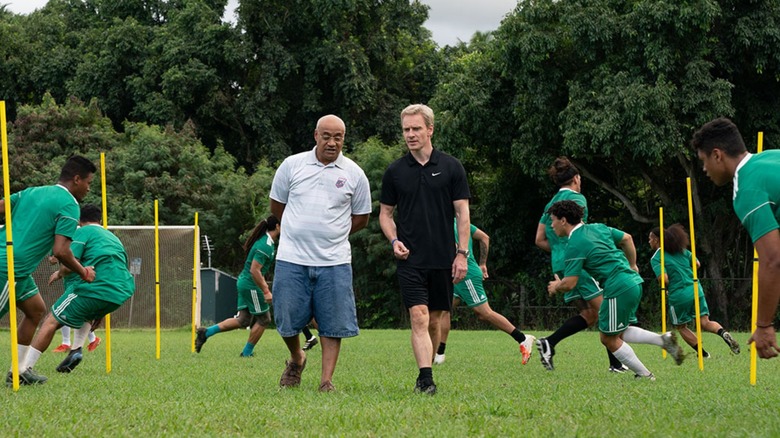Next Goal Wins Review: Taika Waititi's Latest Is A Disastrous Sports Movie [TIFF 2023]
American Samoa is a U.S. territory in the South Pacific. With a population of just 45,000, it's a quiet nation, but it's got a national soccer team. Only problem? They're terrible. In 2001, they weren't just terrible — they were quite literally the worst in the world. It was that year they would play a match that would go down in history: a 31-0 defeat to Australia, which is still the worst loss ever recorded in an international match.
"Next Goal Wins," directed by Taika Waititi, takes place 10 years later in 2011. With the American Samoa team facing World Cup qualifiers, they have a fairly modest objective in mind — score a goal. Just one. To achieve this, they hire Thomas Rongen (Michael Fassbender) an experienced but disgraced American coach to try and give them the boost they need, out of the bottom of the rankings and into ... well, anywhere but rock bottom would be a nice start.
Taika Waititi has become one of Hollywood's biggest names. Beginning in his native New Zealand with beloved films like "Boy," "What We Do In The Shadows" and "Hunt For The Wilderpeople," Waititi transitioned to Hollywood and directed the MCU movie "Thor: Ragnarok" in 2017. Since then, he's been practically omnipotent, with two recurring television shows and countless acting roles, and as of right now, he has seven different projects in development as director according to IMDb. He's even got an Oscar for the apocalyptically-bad "Jojo Rabbit," confirming Waititi as one of the most in-demand filmmakers currently working. "Next Goal Wins" proves that Waititi probably needs a break — to put it gently, this is an awful movie.
Derivative, lifeless, and misguided
Inexplicably, "Next Goal Wins" is narrated by Waititi himself, who also appears in the film as a priest. The narration offers absolutely nothing in terms of development or insight, instead feeling like little more than a wink-wink-nudge-nudge opportunity to see Waititi in the film he's written and directed — except it comes off more like groan-groan wince-wince. It's a weird addition to "Next Goal Wins" that only serves to distract from the main story, coming across as an unbalanced ego rather than a thoughtful storytelling decision.
Every plot beat of "Next Goal Wins" goes how'd you expect. In the beginning, we see the American Samoa soccer team struggle in a performance, looking out of sync and discombobulated. The moment you see it you just know that a training montage is coming where they will do the exact same thing, but in sync. And rest assured, that's exactly what happens! The script, written by Waititi and Iain Morris, apes countless other sports movies, closely following a formula. The dialogue is so lifeless and the characters so one-dimensional, painting in the broadest possible strokes that the formulaic nature has rarely felt this grating and exhausting.
The movie makes the baffling decision to focus on the irascible coach Rongen and his quest to turn the American Samoan team into winners. There's not much to Rongen — he's prone to rage, is suffering through a divorce, and ... okay, that's pretty much it. There's genuinely nothing interesting about the character, and even less compelling is Fassbender's performance, who seems bored out of his mind, not even attempting to add layers to the character. There's a joke early in the film about how the introduction of Rongen would create a white savior narrative. That's funny until you realize that's exactly what happens. When Rongen is on the phone with his ex-wife, she tells him, "We didn't send you there to help them. We sent you there to help you." This isn't helped by the fact that "Next Goal Wins" has no interest whatsoever in establishing the soccer players — if you can remember more than two of their names a day after seeing the film I'd be stunned.
The one other character besides Rongen the film is interested in is Jaiyah (Kaimana), the first trans woman to ever play in a World Cup qualifier. Kaimana does the best they can in the role, but the relationship between Rongen and Jaiyah is incredibly distasteful — disingenuous at best, and transphobic at worst. Rongen repeatedly deadnames Jaiyah, disrespecting her basic humanity in an attempt to motivate her. It's all queasily wrapped up in a quick apology, and then Rongen continues to be awful, but that's apparently okay, because the movie decides it is. Their unlikely friendship forms the emotional crux of the film, but it's completely unbelievable.
A red card in cinematic form
At least there are jokes! So many jokes. Or at least, what the movie deems to be "jokes." But the humor (I'm using that word loosely) in "Next Goal Wins" repeats the same ideas over and over — that American Samoa is (gasp!) different than the United States, and that the American Samoa soccer team is terrible at soccer. What's cute at first — there's laughter to be mined from culture clashes and people being bad at sports — soon becomes cloying and unimaginative. There's the odd laugh that breaks through but the script feels desperate, trying to make you laugh at every imaginable moment, hurtling things along so you can't tell how shallow the whole operation is. It doesn't work.
The one moment "Next Goal Wins" actually manages to become effective, rousing even, is at the end, when Waititi finally recalibrates the focus of the movie on the people that actually matter — the soccer players. Out from Rongen's shadow, the movie discovers a certain charm and energy it lacked, but it's all too little too late, and can't save the disaster that came before it. If anything, it's more frustrating than what came before it, as you realize that "Next Goal Wins" could have at least been passable had it focused on the players themselves.
For a film all about unity and teamwork, "Next Goal Wins" comes off as wildly disconnected. Perhaps Waititi is running on fumes, as the once upstart New Zealand filmmaker is now absolutely everywhere, with countless film and television projects on the go. But it's hard to ignore that "Next Goal Wins" feels like it's made by a director out of ideas — it's a film made up of lazy, visually vacant, and soulless filmmaking. I guess it could have been worse — he could have made "Jojo Rabbit" again.
/Film Rating: 2 out of 10


